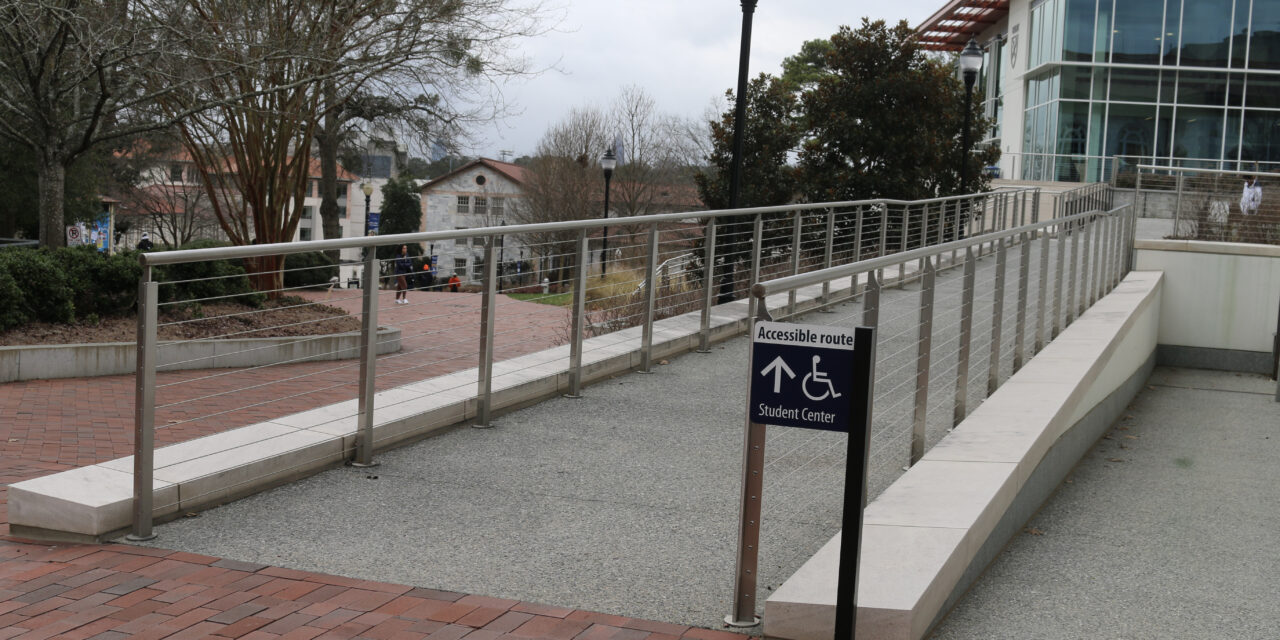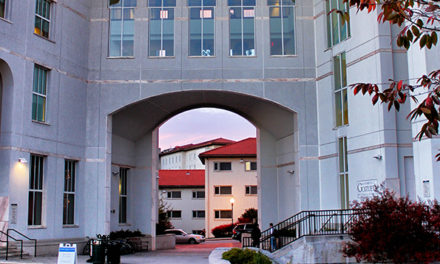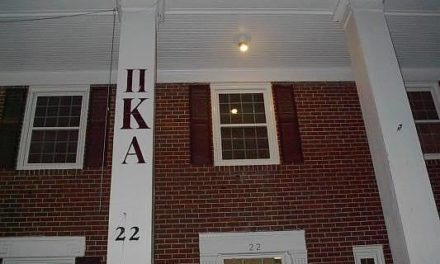Most students can make the walk from Raoul Hall to Callaway Memorial Center in about six minutes. Once they are out the door, it is a straight shot past the Emory Student Center and across Asbury Circle before they can enter Callaway through the south entrance. For Jaden Ellman (24C), however, the trek is not always that simple.
Ellman is one in about 126,000 people in the United States who have Charcot-Marie-Tooth disease, a neuromuscular condition that impairs muscle strength in the feet, legs and hands. For Ellman, this means he struggles to walk long distances and often relies on a mobility scooter to help get around campus.
On rainy days, the paratransit services, a subset of Emory University’s transportation department, used to drive Ellman to his classes as a part of his Department of Accessibility Services (DAS) accommodations. However, Ellman eventually stopped using the service because it was inconvenient. He described the buses’ route as “silly,” as paratransit starts at Raoul Circle, loops to Emory Village, then up Dickey Drive to drop him off near Asbury Circle, only cutting the walking distance roughly in half.
As a result, Ellman said he was forced to walk without his mobility scooter on brick paths in the rain to get from Asbury Circle to Callaway. And, because carrying his bag was difficult enough, Ellman often did not bring an umbrella either. This walk, Ellman said, was ultimately more strenuous and time-consuming than if he had taken the scooter in the first place.
“I pretty much, starting last semester, sort of just gave up on using paratransit,” Ellman said. “If it’s raining, I just kind of take the scooter and hope for the best.”
To determine the best mode of transportation, including reviewing pick-up and drop-off locations, Transportation and Parking Services works with DAS and registered students, according to Assistant Director of Transportation Walter Kolis.
Though Ellman explained that students will inevitably need to put in extra work to get their accommodations met, he said he felt that much of the hassle on his part “could have been avoided.”
“The goal of an accessibility office, anyone advocating for accessibility, should be to minimize the amount of that extra work that people need to get the accommodations they need because ultimately that’s the whole point of accommodations is to even the playing field and make people comfortable,” Ellman said.
Ellman is not alone in his accessibility needs. The Centers for Disease Control and Prevention estimated in 2022 that over 61 million people in the U.S. have a disability, making up 26% of the nation’s population — roughly equal to the percentage of people in the U.S. who have blue eyes. The South has the highest percentage of people with disabilities at 11% in metro areas.
Emory provides a variety of accessibility services that help facilitate accommodations and equal access to students. But, according to disabled students like Ellman, failures within Emory’s accessibility services have led to “a number of frustrating experiences.”
“People are always kind of surprised by that,” Ellman said. “It’s not something that is talked about a lot.”
According to the Americans with Disabilities Act (ADA), disabilities are physical or mental impairments that “substantially” limit one or more major life activities. Ellman said that he has not seen any other students on Emory’s campus who have “a visible physical disability” like him.
“There are a lot of students here and it’s an area of diversity that Emory really lacks in,” Ellman said.
Ella Day (26C), who has autism, said that disabilities are not always visible. Day uses a service dog named Sadie and said people often question her dog’s necessity. She added that people with invisible disabilities are often seen as not truly disabled.
“If you’re not seen as a true disabled person, then it’s literally impossible to receive any sort of accommodations or accessibility in general,” Day said. “I don’t think there’s anything more frustrating than not feeling believed.”
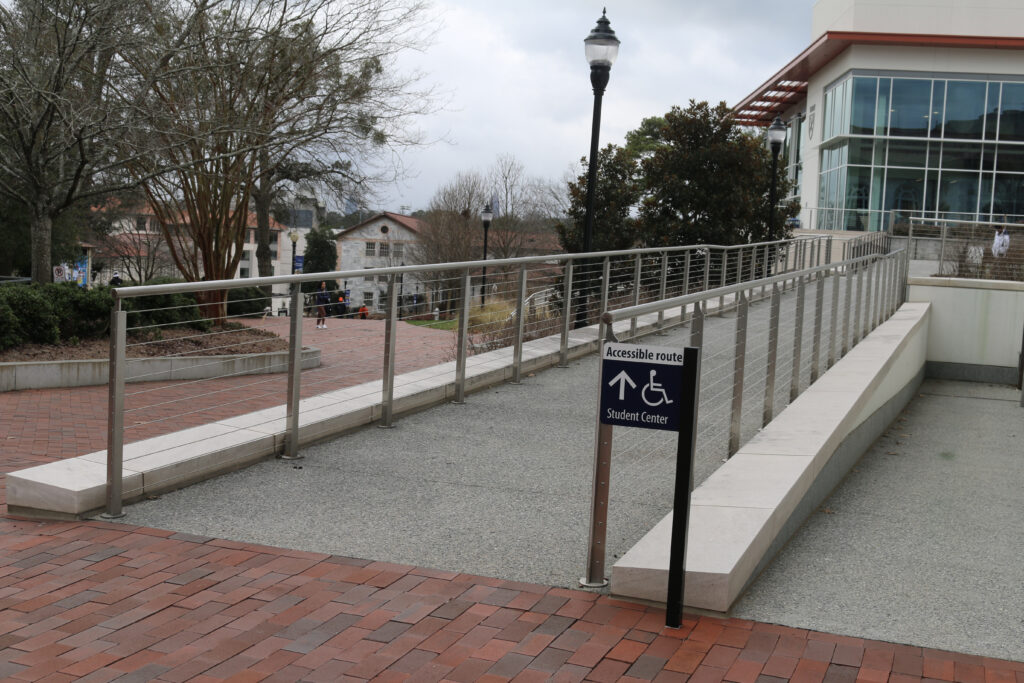
An accessibility ramp is located next to the Emory Student Center. (Anna Schwartz/Staff Photographer)
Accessing accommodations at Emory
To receive accommodations at Emory, students must register with DAS, which works with other offices, such as Residence Life and Housing Operations, to develop plans tailored to each student, according to DAS Director and ADA Compliance Officer Allison Butler.
“While students may begin their accessibility journey at Emory with DAS, it is important to understand our office is not solely responsible for meeting accessibility needs,” Butler wrote in an email to the Wheel.
This collaborative approach is where DAS struggles, Ellman said, citing his difficulties with paratransit as one example. After dropping a class and notifying DAS, paratransit buses continued to show up to Ellman’s dorm to pick him up, flooding his phone with calls when he did not come. He also said it took him two years of emailing with the athletic department to get an adaptive physical education (PE) credit, explaining that the athletics department was not informed on how to handle the situation and that DAS did not help facilitate the process after initially approving the accommodation.
Butler did not respond when asked why DAS does not directly facilitate accommodations. Instead, DAS communicates recommendations for Adaptive PE to the Department of Athletics.
“All Adaptive PE is managed by Athletics,” Butler wrote. “Once a student is approved for Adaptive PE, there are key contacts at Atlanta and Oxford who are notified.”
Ellman said he does not blame the individuals involved in the miscommunication with DAS, instead emphasizing the importance of properly training other Emory departments.
“It’s not their fault,” Ellman said. “They don’t know what to do because either they haven’t been told what to do or whoever told them what to do didn’t do a very good job.”
In response, Butler noted that “DAS offers an array of presentations, tabling, information sessions and other programming.” Diamond wrote in an email to the Wheel that these resources are intended to increase DAS’ visibility and educate “students and campus constituents about the services DAS provides in cooperation with other campus partners.”
Ellman also encountered roadblocks during his first year when trying to access Raoul, which did not have handicap buttons on the outside of the building at the time for security reasons. As a result, he had to stand up and open the door, hit the handicap button inside, walk back out and then drive back inside on his scooter — a painful routine because of his mobility issues, Ellman explained.
Ellman’s parents got involved after he fell and hurt himself in the process of entering Raoul in February 2021. DAS then began to fix the issue, according to Ellman.
The University ultimately reprogrammed Ellman’s EmoryCard to automatically open Raoul’s doors. As of April 12, about 73.68% of housing options across Emory’s Atlanta and Clairmont campuses are considered wheelchair accessible.
Ellman described repeatedly voicing his concerns to DAS as “degrading.”
“It was like no one was listening to me,” Ellman said. “At a certain point, I just got so exhausted by the stress of working with them and feeling like my voice wasn’t being heard.”
Butler declined to comment on Ellman’s situation and pointed to Campus Services, the Emory Police Department (EPD) and Housing Operations as responsible for building access.
When asked about Ellman’s complaints, EPD Communications Director Morieka Johnson (94C) wrote in an email to the Wheel that DAS manages disabled students’ needs. Raymond John Hebert directed the Wheel back to University communications.
Other students, such as Disabled Medical Student Association (DMSA) Founder and Vice President Sydney Doman (25M), said that they have faced obstacles with acquiring documentation for accommodations.
On top of medical forms describing the disability in comprehensive detail, cognitive disabilities require a comprehensive neuropsychological or psychoeducational evaluation — which can cost more than $3,000 with insurance, according to Doman — and measures for attention deficit hyperactivity disorder and autism.
“Medical school is hard enough and then to have to spend all this time getting accommodations, getting the paperwork, going to the doctor,” Doman said. “It can get excessive.”
Proper documentation, according to Butler, is important to provide the University with “verification” of a disability. She declined to comment on Doman’s specific situation but pointed out that every institution, including Emory, can “establish processes and procedures to determine eligibility for accommodation services.” Much of the guidelines disabled students can expect can be found online, such as Emory’s published requirements and the U.S. Department of Education Office for Civil Rights’ guidance.
Additionally, in the case that a student requests accommodations unfamiliar to DAS, Doman said that students may have to do their own research to propose how to implement their accommodations in a cost-effective way, an “unfortunate” outcome that can lead to months of delay.
Butler stated that students must be a part of the “interactive” process with DAS, campus partners and faculty members to find a solution to a “non-standard” accommodation request.
However, not all students have reported a negative experience with DAS. Day said that despite communication issues, the process of getting accommodations for her has been “easy.” Doman added that DAS does a “wonderful” job with testing accommodations.
“Those are [the] easiest accommodations to get and execute,” Doman wrote in a follow-up email to the Wheel. “It’s the classroom, lab and clinical accommodations that are the most painful.”
Associate Dean of Student Success Christen Hairston currently serves as the liaison for the Emory School of Medicine, where she ensures access to testing and clinical learning accommodations, among other learner needs. Director of Academic Affairs Operations Sherice Allen-Henry (20L), who held the position before departing last month, declined to comment on the scope of her work because she said it will likely change after she left, but praised DAS.
“DAS is a great partner and has shown great commitment and care to our students,” Allen-Henry wrote in an email to the Wheel.
Professor of English Emerita Rosemarie Garland-Thomson, who has been called a “disability justice and culture thought leader,” added that the process of acquiring accommodations at Emory was “pretty good,” but cited difficulties with her own accommodations.
Garland-Thomson, who has a congenital upper body mobility limitation that affects the use of her hands and arms, requires a talk-to-text program to write. Though Emory provides her the program as part of her accommodation, Garland-Thomson said she faced roadblocks in getting technical support through the Office of Information Technology.
“It’s hard for me to understand how they can potentially get away with saying, ‘We’ll provide this … but we won’t support it,’” Garland-Thomson said. “Many other universities that I have traveled to — and I’ve visited a lot of universities — provide coordination among disability services, technology accommodations and disability studies so that it all works together to create a welcoming, overall accessible environment. And, that has not happened at Emory.”
Associate Dean of Academic Technology Services Kim Braxton said the department works “closely” with DAS on specific support needs, adding that Student Technology Support assists with installation of speech-to-text services, which school-specific information technology units may also help with. Braxton did not comment on how professors and other faculty may receive technical support.
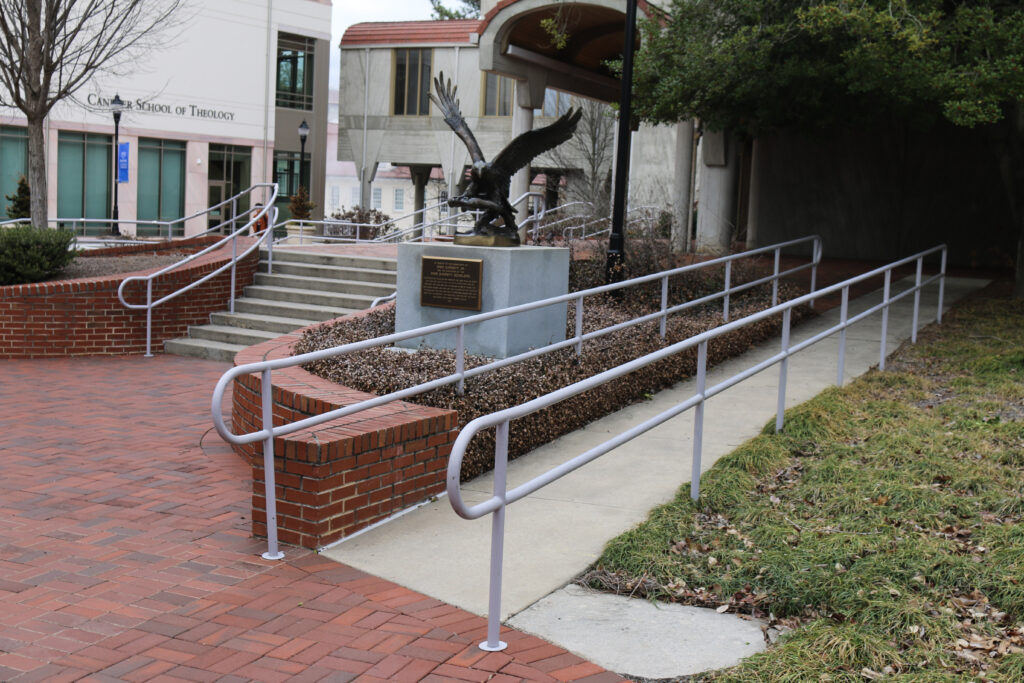
An accessibility ramp is located near Cannon Chapel. (Anna Schwartz/Staff Photographer)
Recommended solutions
Though many have had difficulties at Emory, Ellman, Doman, Day and Garland-Thomson agree that improving accessibility is not a lost cause.
“I don’t just want to slam Emory,” Ellman said. “School is a great place in a lot of different ways, but this is one area where they can certainly improve a lot, and really there should be more of a demand for improvement on that front.”
Doman pointed to Stanford University’s (Calif.) Medicine Alliance for Disability Inclusion and Equity, which advocates for dismantling systemic ableism discrimination, and the University of Michigan’s Medical Ergonomics consultation team and the U-M Council for Disability Concerns as models Emory might look to in improving their accessibility services. She also recommended hiring more disabled faculty members.
“We are just not there yet,” Doman said. “Some of that takes recruitment. That’s hard to do, but some of it is just having the infrastructure and putting out the … expectations that you will be supported and are valued.”
Associate Vice Provost for Institutional Equity and Compliance Maurice Middleton (20L) said that Emory is committed to recruiting “a diverse workforce,” including disabled individuals, by expanding advertising of employment opportunities and partnering with the Georgia Department of Labor to reach a broader applicant pool.
“It is important to note that not all disabilities are visible, and some individuals may choose not to disclose their disability at the time of employment,” Middleton wrote in an email to the Wheel. “Emory is taking steps to encourage faculty and staff to feel comfortable disclosing their disability status during the application process and throughout their employment.”
Middleton said that the Office of Institutional Equity and Compliance, which includes DAS, the Department of Equity and Inclusion and the Department of Title IX, works with University partners to promote a barrier-free, “inclusive community for all.”
Additionally, Emory Human Resources plans to establish an employee network for employees with disabilities within the next year in light of employee feedback, according to Senior Recognition and Engagement Manager Melissa Morgan.
“These groups benefit the Emory community by bringing together employees with similar interests, issues or identities and their allies,” Morgan wrote in an email to the Wheel. “They help foster a sense of belonging and community by providing opportunities for networking and social connection and raise awareness to many programs and resources that are available for employees.”
Spreading awareness is another component of addressing ableism on campus, Day said. To do so, Day documents her experience with her service dog on Instagram and TikTok. Her most popular TikTok has 1.5 million views.
“People are really scared to talk about it because if you aren’t personally disabled, you think it might be taboo to talk about it,” Day said. “It’s not something that should have to be shamed. The more conversations we have, the more inclusive we can make our campus.”
As a professor, Garland-Thomson said she spread awareness by focusing on learning, teaching and research, but faced difficulty in creating a disabilities studies degree, citing the administrative burden of overseeing the program on her teaching and research obligations. Other universities, such as Columbia University (N.Y.) and the University of California, Berkeley have disability study programs.
“There wasn’t enough capacity,” Garland-Thomson said. “And so, it was much more productive to put our time and energy into that. Now, I’m not sure that was the best decision.”
Day added that Emory’s lack of a disabilities studies major is a “shame.” Though Middleton said that professors have incorporated disability studies into existing programs, such as women’s gender and sexuality studies, sociology and French and Italian, Day believes it isn’t enough.
“Any field can incorporate things about disability, just considering that in your workforce alone, you’ll probably have to interact with disabled people,” Day said. “No matter what field people are studying, it’s something that should be looked into and should be talked about.”
Garland-Thomson spearheaded a disabilities studies initiative at Emory alongside the late Candler School of Theology Associate Professor Nancy Eiesland in 2001. She described the initiative as a grassroots effort from students, faculty and deans.
Though academic programs are important, Doman said that the “ultimate” solution is anticipating disabled peoples’ needs through accessible facilities and attitudes.
“Those who do register now have a drastically smaller list of things they have to figure out and less meetings with professors and staff about logistics,” Doman wrote. “It also sends a message to applicants and potential students that we are welcoming and helps recruit a more diverse student body.”
Student body diversity is important for the future of health care and disability justice, according to Doman.
“Disabled physicians have this degree of empathy that you just can’t teach,” Doman said. “They’re just incredible advocates because … we know what it’s like to have the shoe on the other foot.”
Correction (4/13/23 at 4:30 p.m.): A previous version of this article stated that “DAS does not directly facilitate physical education accommodations, because PE credits are managed by a separate department.” The article has been updated to clarify that DAS relays recommendations for Adaptive PE to the Department of Athletics.
Correction (4/13/23 at 4:3o p.m.): A previous version of this article stated that “DAS offers an “array” of presentations, tabling, information sessions and other programming to help ease partnerships with other departments.” The article has been updated to clarify these resources are intended to increase DAS’ visibility and educate students about the services DAS provides.
Correction (4/13/23 at 4:30 p.m.): A previous version of this article stated that “Associate Vice Provost for Institutional Equity and Compliance Maurice Middleton (20L) said that Emory is committed to recruiting disabled individuals.” The article has been updated to clarify that Middleton specified recruiting “a diverse workforce,” which includes recruiting disabled candidates.
Nica Leung (she/her, 26C) is from Portland, Ore., and is majoring in political science and anthropology on the pre-law track. Outside of the Wheel, she can be found inhaling matcha lattes at Kaldi's, playing Neko Atsume, exploring the Emory arts scene or spending time with friends.

